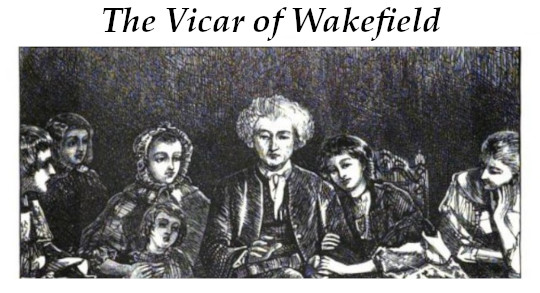Oliver Goldsmith? H. L. Mencken? Apocryphal?

Question for Quote Investigator: In the Internet Age a falsehood is sometimes repeated incessantly and propagated across the world. Yet, the collective voice of one million people cannot transform a falsehood into a truth. This insight has a long history. The prominent Anglo-Irish novelist and playwright Oliver Goldsmith said something like this in the 1700s. Would you please help me to find a citation.
Reply from Quote Investigator: In 1766 Oliver Goldsmith published the novel “The Vicar of Wakefield” which contained the following statement. Boldface added to excerpts:1
. . . the united voice of myriads cannot lend the smallest foundation to falsehood.
Below are additional selected citations in chronological order.
The narrator of the Goldsmith’s novel discussed his opposition to the death penalty for stealing property such as a horse. He rejected any compact between individuals that would enforce such a draconian punishment because he believed that no one had the right to bargain for a life. He also believed that the penalty was disproportionate. Here is a longer excerpt containing the quotation:
But a compact that is false between two men, is equally so between an hundred, or an hundred thousand; for as ten millions of circles can never make a square, so the united voice of myriads cannot lend the smallest foundation to falsehood. It is thus that reason speaks, and untutored nature says the same thing.
Oliver Goldsmith died in 1774, and the passage containing the quotation was deemed memorable enough to include in a posthumous collection titled “The Beauties of Goldsmith: or, The Moral and Sentimental Treasury of Genius” in 1782.2
In 1942 H. L. Mencken included the adage in his massive reference book “A New Dictionary of Quotations on Historical Principles from Ancient and Modern Sources”. Interestingly, Mencken made a small but significant alteration; he changed ” myriads” to “millions”:3
The united voice of millions cannot lend the smallest foundation to falsehood.
OLIVER GOLDSMITH: The Vicar of Wakefield, viii, 1766
In 1949 Burton Stevenson’s “The Home Book of Quotations” included the correct quotation:4
As ten millions of circles can never make a square, so the united voice of myriads cannot lend the smallest foundation to falsehood.
GOLDSMITH, The Vicar of Wakefield. Ch. 8.
In 1967 the syndicated newspaper puzzle “Cryptoquote” echoed the version in Mencken’s compilation:5
Yesterday’s Cryptoquote: THE UNITED VOICE OF MILLIONS CANNOT LEND THE SMALLEST FOUNDATION TO FALSEHOOD.—GOLDSMITH
In 1997 “The Forbes Book of Business Quotations” printed the instance in Mencken’s compilation:6
The united voice of millions cannot lend the smallest foundation to falsehood.
Oliver Goldsmith
In conclusion, Oliver Goldsmith deserves credit for the remark he penned in 1766. A slightly modified version of the quotation entered circulation by 1942.
Image Notes: Illustration from the 1865 book “Dalziels’ Illustrated Goldsmith” depicting the Vicar of Wakefield and his family.
Acknowledgement: Great thanks to the anonymous person whose inquiry led QI to formulate this question and perform this exploration. The person encountered the saying in Mencken’s book, but was unable to find the statement in Goldsmith’s oeuvre because of the small alteration.
Update History: On March 26, 2025 the format of the bibliographical notes was updated.
- 1766, The Vicar of Wakefield by Oliver Goldsmith, Part 2 of 2, Chapter 8, Quote Page 121, Printed by B. Collins for F. Newbery, London. (Eighteenth Century Collections Online ECCO) link ↩︎
- 1782, The Beauties of Goldsmith: or, The Moral and Sentimental Treasury of Genius by Oliver Goldsmith, Chapter: Legislative Power, Quote Page 167, Printed for G. Kearsley, London. (Eighteenth Century Collections Online ECCO) link ↩︎
- 1942, A New Dictionary of Quotations on Historical Principles from Ancient and Modern Sources, Selected and Edited by H. L. Mencken (Henry Louis Mencken), Topic: Falsehood, Quote Page 381, Column 2, Alfred A. Knopf. New York. (Verified with hardcopy) ↩︎
- 1949, The Home Book of Quotations: Classical and Modern, Selected by Burton Stevenson, Sixth Edition, Topic: Lies, Quote Page 1111, Column 1, Dodd, Mead and Company, New York. (Internet Archive at archive.org) ↩︎
- 1967 December 1, The Daily Notes, Cryptoquote from King Features Syndicate, Quote Page 2, Column 3, Canonsburg, Pennsylvania. (Newspapers_com) ↩︎
- 1997, The Forbes Book of Business Quotations: 14,173 Thoughts on the Business of Life, Edited by Ted Goodman, Topic: False, Quote Page 277, Column 2, Black Dog & Leventhal Publishers, New York. (Verified with scans) ↩︎